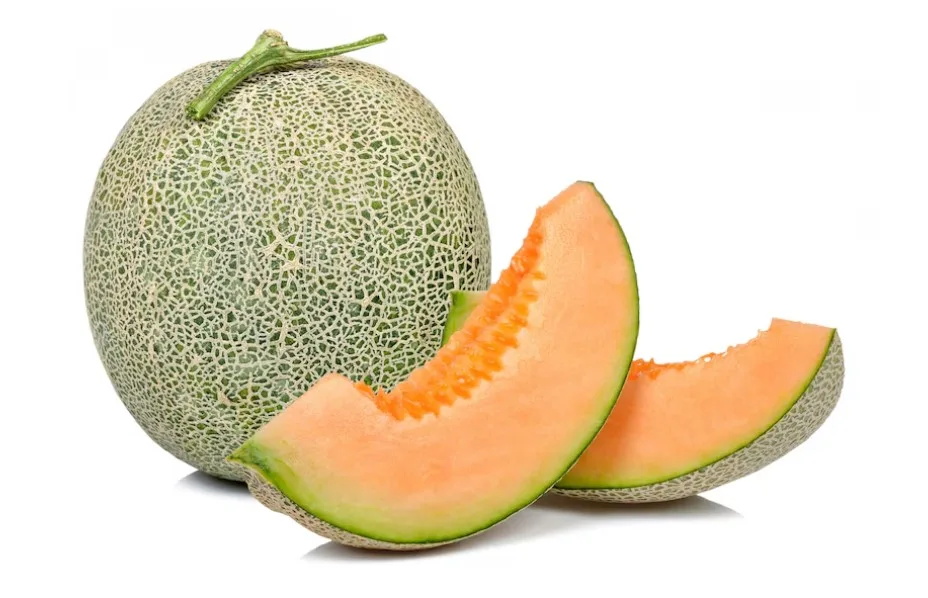Cantaloupe, also known as muskmelon, is a popular summer fruit cherished for its sweet, juicy flavor and vibrant orange flesh. This refreshing melon is not only delicious but also packed with essential nutrients that offer numerous health benefits. In this article, we will explore the various health benefits and uses of cantaloupe, highlighting why this fruit should be a staple in your diet.
Nutritional Profile of Cantaloupe
Cantaloupe is a nutrient-dense fruit, meaning it provides a significant amount of vitamins and minerals for a relatively low-calorie intake. A one-cup serving of cantaloupe (about 156 grams) contains approximately:
- Calories: 60
- Protein: 1.5 grams
- Carbohydrates: 14.4 grams
- Fiber: 1.6 grams
- Vitamin A: 120% of the Daily Value (DV)
- Vitamin C: 108% of the DV
- Potassium: 14% of the DV
- Folate: 8% of the DV
- Magnesium: 5% of the DV

Health Benefits of Cantaloupe
1. Boosts Immune System
Cantaloupe is an excellent source of vitamins A and C, both of which play a crucial role in maintaining a healthy immune system. Vitamin C acts as an antioxidant, protecting cells from damage and promoting the production of white blood cells. Vitamin A, on the other hand, is essential for the proper functioning of the immune system and helps maintain the health of skin and mucous membranes, which act as barriers to infections.
2. Promotes Eye Health
The high vitamin A content in cantaloupe is beneficial for eye health. Vitamin A is a vital component of rhodopsin, a protein in the eyes that allows for vision in low-light conditions. Additionally, cantaloupe contains beta-carotene, a precursor to vitamin A, which has been shown to reduce the risk of age-related macular degeneration and cataracts.
3. Supports Heart Health
Cantaloupe is rich in potassium, a mineral that helps regulate blood pressure by counteracting the effects of sodium. Adequate potassium intake is associated with a reduced risk of stroke and other cardiovascular diseases. The fiber content in cantaloupe also contributes to heart health by helping to lower cholesterol levels.
4. Aids in Digestion
The fiber in cantaloupe supports a healthy digestive system by promoting regular bowel movements and preventing constipation. Additionally, the high water content of cantaloupe helps keep the digestive tract hydrated, further aiding in digestion.
5. Hydrates and Rejuvenates Skin
Cantaloupe is composed of approximately 90% water, making it an excellent choice for hydration. Staying hydrated is essential for maintaining healthy skin, as it helps to keep skin cells plump and promotes a youthful appearance. The vitamins A and C in cantaloupe also contribute to skin health by promoting collagen production and protecting against sun damage.
6. Helps in Weight Management
With its low calorie and high water content, cantaloupe is an ideal fruit for those looking to manage their weight. It provides a satisfying sweetness without the high calorie load of many other snacks, making it a perfect addition to a balanced diet.
7. Reduces Inflammation
Cantaloupe contains several antioxidants, including vitamin C, beta-carotene, and cucurbitacin E, which have anti-inflammatory properties. These compounds help to reduce inflammation in the body, which can lower the risk of chronic diseases such as arthritis, heart disease, and certain cancers. By incorporating cantaloupe into your diet, you can help combat inflammation and promote overall health.

Uses of Cantaloupe in Everyday Diet
Cantaloupe’s versatility makes it easy to incorporate into various dishes and snacks. Here are some creative and healthy ways to enjoy cantaloupe:
1. Fresh Slices and Cubes
The simplest way to enjoy cantaloupe is to cut it into slices or cubes. This makes for a refreshing and hydrating snack that can be enjoyed at any time of the day.
2. Smoothies and Juices
Cantaloupe can be blended into smoothies or juices for a nutritious and delicious drink. Combine it with other fruits like berries, bananas, or citrus for a refreshing beverage packed with vitamins and antioxidants.
3. Fruit Salads
Add cantaloupe to fruit salads to enhance flavor and nutritional value. It pairs well with other melons, such as watermelon and honeydew, as well as with berries, grapes, and citrus fruits.
4. Cantaloupe Sorbet
For a healthy dessert option, try making cantaloupe sorbet. Blend cantaloupe with a bit of honey and lemon juice, then freeze the mixture. This results in a naturally sweet, low-calorie treat perfect for hot summer days.
5. Grilled Cantaloupe
Grilling cantaloupe can bring out its natural sweetness and add a unique flavor twist. Brush cantaloupe slices with a bit of honey and grill for a few minutes on each side until caramelized.
6. Cantaloupe Salsa
Create a refreshing cantaloupe salsa by combining diced cantaloupe with ingredients like red onion, cilantro, lime juice, and jalapeños. This sweet and spicy salsa pairs well with grilled fish or chicken.
Tips for Selecting and Storing Cantaloupe
To fully enjoy the benefits and flavor of cantaloupe, it’s important to select a ripe fruit and store it properly.
Selecting Cantaloupe
- Look for a Uniform Shape: Choose cantaloupes that are symmetrical and free from major dents or bruises.
- Check the Skin: The rind should have a raised, net-like texture and a beige or golden color.
- Smell the Stem End: A ripe cantaloupe will have a sweet, fragrant aroma at the stem end.
- Feel the Weight: A ripe cantaloupe should feel heavy for its size, indicating high water content.
Storing Cantaloupe
- Whole Cantaloupe: Store whole cantaloupe at room temperature until it ripens. Once ripe, it can be stored in the refrigerator for up to five days.
- Cut Cantaloupe: Store cut cantaloupe in an airtight container in the refrigerator and consume within three days for the best flavor and texture.
Conclusion
Cantaloupe is a delicious and nutritious fruit that offers numerous health benefits, from boosting the immune system to promoting heart and skin health. Its versatility makes it easy to incorporate into a variety of dishes, making it a valuable addition to any diet. By selecting and storing cantaloupe properly, you can enjoy its sweet, refreshing flavor and reap the full benefits of this amazing fruit. Whether enjoyed fresh, blended into smoothies, or added to salads and salsas, cantaloupe is a summer favorite that supports overall health and well-being.
Topics covered
- What is Cantaloupe?
- What are key nutrients in Cantaloupe?
- What are health benefits of Cantaloupe?
- How to choose best Cantaloupe?
- What are uses of Cantaloupe?








An excellent read that will keep readers – particularly me – coming back for more! Also, I’d genuinely appreciate if you check my website QU6 about Airport Transfer. Thank you and best of luck!